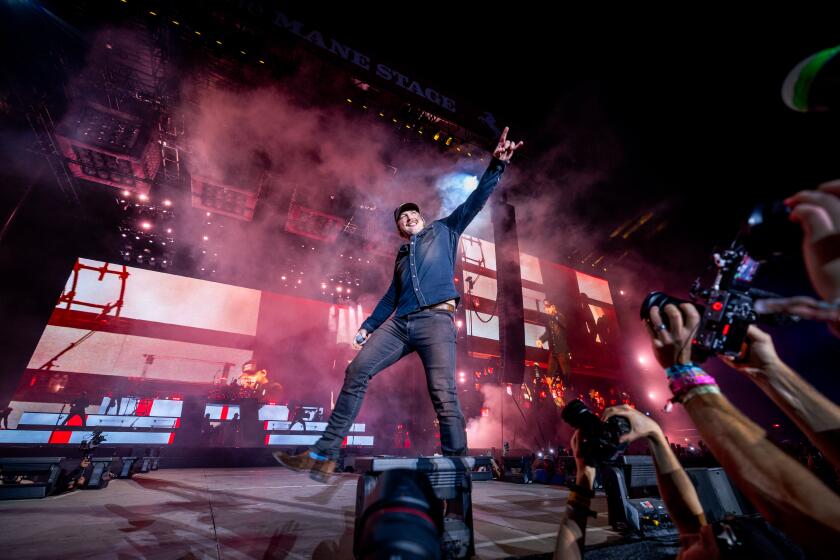Don’t get them wrong: It’s not a nostalgia act
The daily ritual is always the same: nine guys kneeling around a pile of money in Studio B at Henson Recording Studios in Hollywood, shouting, cheering and moaning as a pair of dice rolls across the carpet, delivering moments of euphoria and defeat. The members of Alice in Chains are among the group, briefly distracted from their final week of sessions for the band’s first album of new material in nearly 14 years. Against the wall is an impressive row of vintage electric and acoustic guitars. Incense is burning and a U.S. flag hangs over a sound partition. But for the moment, the rock will have to wait.
Guitarist Jerry Cantrell looks up from his pile of cash and smiles. “Compared to how we used to have fun,” he says, “this is pretty tame.” The low-stakes game is Left, Center, Right, and many $5 bills change hands before it’s over. The day’s winner is producer Nick Raskulinecz, laughing now as drummer Sean Kinney grumbles something about the man’s take of “two hundred bucks in the last two games.”
The real challenge is still ahead, as the three surviving members of Alice in Chains -- Cantrell, Kinney and bassist Mike Inez -- work to complete new songs as a band for the first time since the death of singer Layne Staley from a heroin and cocaine overdose in 2002 at the age of 34. Their album, still untitled and set for release mid-September on Virgin/EMI, will be another case study of a major group continuing after the loss of a key member. AC/DC managed the transition successfully back in 1980, while others have failed to match their earlier triumphs, including INXS (whose search for a new singer was turned into a 2005 reality TV show) and classic rock acts Queen and the Doors.
“I don’t think we ever intended to do anything,” says Cantrell, 43, his thick, blond beard marking the months of preparation and recording that has gone into the new album. “With the passing of Layne, all possibility of that went out the window, probably in my mind and everyone else’s too.”
--
Genesis of a comeback
The first sign of a second act came from a chance reunion in Seattle at a 2005 benefit for tsunami relief organized by Kinney. They decided to explore the idea, recruiting singer-guitarist William DuVall, a rock shouter from Atlanta in the Chris Cornell tradition with enough inherent gloom to fit easily within the Alice in Chains sound. His former band, Comes With the Fall, was a favorite of Cantrell’s and was once described by Rolling Stone as “a hard rock delight . . . like Alice unchained.”
Alice in Chains has slowly, methodically rebuilt its career ever since, starting small with a five-city club tour in 2006, followed by longer road trips across the U.S., Europe and Australia. “We bonded by being on the road and by being onstage,” says DuVall, also bearded and wearing a black Stooges T-shirt. “But obviously there is an emotional back story that’s pretty extensive for everybody here.”
Staley, the wounded frontman with a blond goatee, was a bold but at times seemingly frail young rocker, prophesying his own addiction and death in the songs “Sludge Factory” and “God Smack,” where he sang: “What in God’s name have you done? / Stick your arm for some real fun.” His slow decline and isolation cut short the life of a band still at a popular peak.
Staley’s last live stage performance with Alice in Chains was in 1996. Reassembling the group was painful, says Cantrell, and public.
“It’s never a bad thing to work on yourself or walk through some heinous [stuff] in your life,” he says. “It’s whether you want to do it or not. I probably wouldn’t have wanted to do it on my own, and the reason it was better is because we were doing it together.”
The group found a surprisingly young audience waiting for them at their first reunion shows, including 30,000 fans in Lisbon, Spain, the first stop of their European tour, says Kinney. “They weren’t born yet when our records came out,” he says. “I was a little confused. I expected a bunch of beat-up rock people.”
--
A loud legacy
Alice in Chains’ music was dark and brooding, a mutant blend of alternative rock and real metal, with flashes of big, classic-rock guitar. The band was among the first to emerge from the ‘90s Seattle grunge scene, beating Nirvana and Soundgarden to national fame and multiplatinum record sales, inspiring another generation of hard rock and metal acts, including Godsmack (which took its name from the Alice song). Recapturing that original sound while remaining contemporary was a central mission of the new recordings.
“Being an Alice in Chains fan myself, I know what I want to hear,” says Raskulinecz, previously a producer for Rush, Foo Fighters, and Coheed and Cambria. “It’s a performance record. There’s not any trickery. It’s those guys performing the instruments and singing the parts and doing it over and over and over again until we get it right.”
The band began work on the album last October at Foo Fighter Dave Grohl’s private Studio 606 in Northridge, before moving to Henson in December. “We’ve been working toward this for over a year now,” says Cantrell. “It’s a long haul.”
Among the visitors to their recording sessions was Staley’s mother, who, along with other family members, has expressed ongoing support for the band. “It was really important that it was OK with them,” says manager Susan Silver, who first began representing Alice in Chains 21 years ago and now co-manages the resurrected band with David Benveniste and his Velvet Hammer firm. “There were a lot of baby steps. The first year especially was such a profound healing for everybody.”
There was some initial resistance from within the industry in 2006, particularly from U.S. promoters, she says, but that has largely changed. When Benveniste, who also represents System of a Down, Deftones and Cypress Hill, began approaching record labels with a sampling from the new sessions, the offers started coming from virtually every major label; the band eventually signed with Virgin/EMI.
“The response has been amazing. We got massive offers off of four or five songs,” says Benveniste. “The most important thing to me was that we position this as a new band moving forward. The band is not a heritage act -- this band is a new act and we’re going to market it as such. It’s a double-headed monster.”
--
Men in the box
At Henson, the band gathers around Raskulinecz for a playback of the songs in progress, and the sound is recognizably thundering and gloomy. Harmonizing together, the vocals of Cantrell and DuVall have a familiar texture: “California’s all right / check my brain . . .” The lyric refers to Cantrell relocating to Los Angeles six years ago. Once a proud Seattle rocker with a bad attitude about Southern California, he realized he felt at home here. “I like how I am right now,” he says, “and I like where I’m living.”
There are other hard rock songs played, then an acoustic track called “Your Decision” -- Cantrell’s voice sings of surviving pain and choosing to live. It’s followed by a seven-minute epic built on heavy slabs of guitar, drums and bass, something like Black Sabbath but far quicker.
Raskulinecz sits in the control room with a coffee mug in one hand, playing air drums with the other, while Kinney raises devil horns with both hands. These are the final days in the studio, which Inez compares to “the last day of school, cleaning out the lockers.” When it’s done, Cantrell and DuVall will shave off the beards. They look content, whether over lunch or while throwing dice, but they’re also aware the new album will leave a lasting first impression about the reconstructed Alice in Chains.
“It’s a big thing. I’ve joined a group that has a strong identity and a strong legacy,” says DuVall. “Nobody’s sitting here who wants to, in any way, disrespect or sully that legacy. You want to add to it.”
He stands in the control room, plucking a bluesy riff on a burgundy Gibson SG guitar. He’s preparing to add a few lyrics to a song about a friend, and he decides to postpone lunch.
“You know, I’m going to do it right now, while I’m hungry,” says DuVall.
“I like your attitude,” Raskulinecz replies with a grin.
Behind the microphone, DuVall rips into a tough, raspy flow, barking out scenes of “carnage” and “bodies,” lyrical metaphors for an Atlanta blues guitarist who killed himself the day after his 29th birthday. He’d been another young musician with career struggles, finally unable to survive the life he chose.
“That’s where I found myself for years in many bands. It gets hard, and you only do it because you have to,” DuVall says afterward. “Some of the friends you lose are more famous, but it doesn’t hurt any less.”
--
More to Read
The biggest entertainment stories
Get our big stories about Hollywood, film, television, music, arts, culture and more right in your inbox as soon as they publish.
You may occasionally receive promotional content from the Los Angeles Times.







